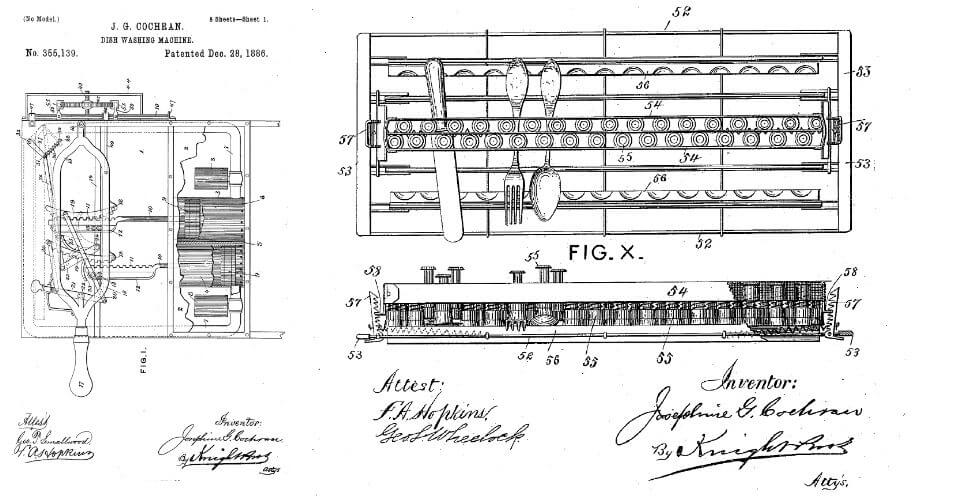The Illinois woman that invented the modern dishwasher
Josephine Cochrane said, “If you want something done right, do it yourself.” That’s what she did. In the 19th century, Josephine Cochrane’s dishwasher invention transformed life in America.
Josephine Cochrane’s early life
Born Josephine Garis on March 8, 1839, in Ashtabula County, Ohio, she grew up in a family of engineers and inventors, which sparked her interest in mechanical devices from an early age. Her father, John Garis, was a civil engineer, and her great-grandfather, John Fitch had created the first patent for a steamboat.
After the death of her mother and her sister’s departure, Cochrane lived with her father in Ohio and Indiana. Her father’s work as a mill supervisor and hydraulic engineer likely influenced her mechanical aptitude. Following a fire that destroyed her high school, she moved to Shelbyville, Illinois, to live with her sister.
At the age of 19, Cochrane married William Cochran, a 27-year-old who had ventured to California for the Gold Rush but returned without success. Despite his previous setback, William found success in the dry goods business and other investments in Shelbyville, providing a comfortable life that appealed to Josephine’s independent and confident nature. She added an ‘e’ to her last name, adopting her husband’s surname.

Motivation for creating the dishwasher
While living a social and lavish lifestyle in Shelbyville, the Cochrane family encountered a dilemma when their servants chipped priceless china dishes while washing them. Josephine infuriated, decided to take charge of managing the china herself. Frustrated with the time-consuming task, she wondered why a machine for washing dishes hadn’t been invented. Determined to find a solution, she famously declared, “If nobody else is going to invent a dishwashing machine, I’ll do it myself.”
Unfortunately, William, rising in the Democratic Party, battled alcoholism, leading to a volatile temper and illness. While Josephine focused on her invention, William passed in 1883.
William’s death left Josephine burdened with enormous debt and only $1,535.59. The dishwasher, initially seen as a convenience, became a necessity for her survival.
Josephine Cochrane’s dishwasher invention patent
In 1886, with the assistance of mechanic George Butters, Cochrane secured a patent for her practical dishwasher design. Her machine used soapy water spray to clean dishes in wire compartments, eliminating the need for hand scrubbing. The dishwasher featured a motor, a water wheel, and a boiler to heat the water. It incorporated a rack system to hold the dishes during the cleaning process securely. Although other inventors had attempted to create similar devices, such as a hand-cranked model patented in 1850, none were commercially viable.

The dishwasher’s early success
Cochrane Initially targeted housewives as her market. However, Cochrane faced hesitancy from potential buyers. As she observed, women were reluctant to spend $75 or $100 on a kitchen appliance, despite their dislike for dishwashing. She realized that women did not consider their time and comfort valuable. Additionally, women were not the sole decision-makers for significant household purchases.
To overcome these challenges, Cochrane shifted her focus to hotels. After selling a dishwasher to the Palmer House Hotel in Chicago, she boldly approached the Sherman House Hotel in the same city. Her courage paid off when she secured an $800 order.
In 1893, Cochrane persuaded restaurants at the World’s Columbian Exposition in Chicago to use her dishwasher, which was exhibited in Machinery Hall and won first place for Best Mechanical Construction. Recognizing the commercial potential of her invention, Cochrane established the Garis-Cochrane Manufacturing Company in 1897 to manufacture and market her dishwashing machines. Her clientele expanded to include hospitals and colleges that valued the sanitizing effects of the hot water rinse.

Josephine Cochrane’s legacy
Even at the age of 73, in 1912, Cochrane personally sold her machines. She passed away a year later, likely due to a stroke or exhaustion, in Chicago and was buried in Glenwood Cemetery in Shelbyville, Illinois.
In 1916, her company was acquired by Hobart, which eventually became KitchenAid and is now a part of the Whirlpool Corporation. By the 1950s, Cochrane’s invention had become a commonplace appliance in households, significantly reducing the time and effort required for dishwashing.
Today, Josephine Cochrane is celebrated as the founder and visionary behind the groundbreaking dishwasher invention. Her induction into the National Inventors Hall of Fame in 2006 honored her enduring legacy. As she reflected near the end of her life, “If I knew all I know today when I began to put the dishwasher on the market, I never would have had the courage to start. But then, I would have missed a very wonderful experience.”




Hi there, I check your blogs daily. Your story-telling
style is awesome, keep it up!